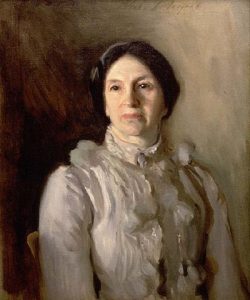By Heather Rockwood, Communications Associate
In my previous post, I introduced Annie Adams Fields, a talented woman who wrote descriptions of contemporary authors in her diaries. She was a socialite married to James T. Fields, an author and publisher. Their circle of friends included American and European authors.
Henry James wrote about Annie in the Atlantic Monthly of July 1915:
The truth was of course very decidedly that the seed I speak of, the seed that has flowered into legend, and with the thick growth of which her domestic scene was quite embowered, had been sown in soil peculiarly grateful and favored by pleasing accidents. The personal beauty of her younger years, long retained and not even at the end of such a stretch of life quite lost; the exquisite native tone and mode of appeal, which anciently we perhaps thought a little “precious,” but from which the distinctive and the preservative were in time to be snatched, a greater extravagance supervening; the signal sweetness of temper and lightness of tact, in fine, were things that prepared together the easy and infallible exercise of what I have called her references. It adds greatly to one’s own measure of the accumulated years to have seen her reach the age at which she could appear to the younger world about her to “go back” wonderfully far, to be almost the only person extant who did, and to owe much of her value to this delicate aroma of antiquity.
Annie’s husband James died in 1881, after which she retired for a while from public life, and her friend, author Sarah Orne Jewett, moved in with her. Once Annie began returning to public life, hosting friends and family at her salon in Boston, Sarah moved out. However, the two women began a “Boston Marriage,” living and traveling together six months of the year, until Sarah died in 1909. The term Boston Marriage referred to two usually independently wealthy women living together, who were not seeking marriage to a man. Some Boston Marriages are now thought to have been romantic, some are not.
As a widow living part of the year with Sarah, Annie continued writing her diaries, especially about her travels. Her descriptions of the places she visited and the people she observed or met there are just as riveting as her earlier writings about her literary friends. On a trip to the Bahamas with Sarah in 1896, she wrote a few lines about a beautiful girl who must have lived near to their hotel.
A young girl in a white muslin dress with two or three gentlemen of varying hues of complexion especially attracted me. The soft olive tint of her skin and the real charm she possessed of manner as well as of face compelled me to turn an instant in her direction whenever the least chance offered itself. She made the whole place instinct with native comeliness of expression to which we were only led up by the soft air, the hibiscus blossoms, the almond trees and the delicate stains of color on the walls and the gates and towers where they were seen peeping out between or above the foliage.
And the next day:
There was a little table there and coffee after dinner, and a mandolin and a Celtic singer—while we strolled about not too near, fascinated by the pretty scene—the tinkling of the strings and above all by the pretty girl. Later she bade farewell to a gentleman in the hall below. The manner was incomparable. I am sure Juliet did no better for her Romeo in public!

Credit: Boston Athenaeum
In his Atlantic Monthly piece on Annie, Henry James also wrote this about her later years:
I have but to recall the dawn of those associations that seemed then to promise everything, and the last declining ray of which rests, just long enough to be caught, on the benign figure of Mrs. Fields, of the latter city, recently deceased and leaving behind her much of the material out of which legend obligingly grows. She herself had the good fortune to assist, during all her later years, at an excellent case of such growth, for which nature not less than circumstance had perfectly fitted her—she was so intrinsically charming a link with the past and abounded so in the pleasure of reference and the grace of fidelity. She helped the present, that of her own actuality, to think well of her producing conditions, to think better of them than of many of those that open for our wonderment to-day: what a note of distinction they were able to contribute, she moved us to remark, what a quality of refinement they appeared to have encouraged, what a minor form of the monstrous modern noise they seemed to have been consistent with!
There is so much more to read in Annie Adams Fields’s fascinating diaries.

